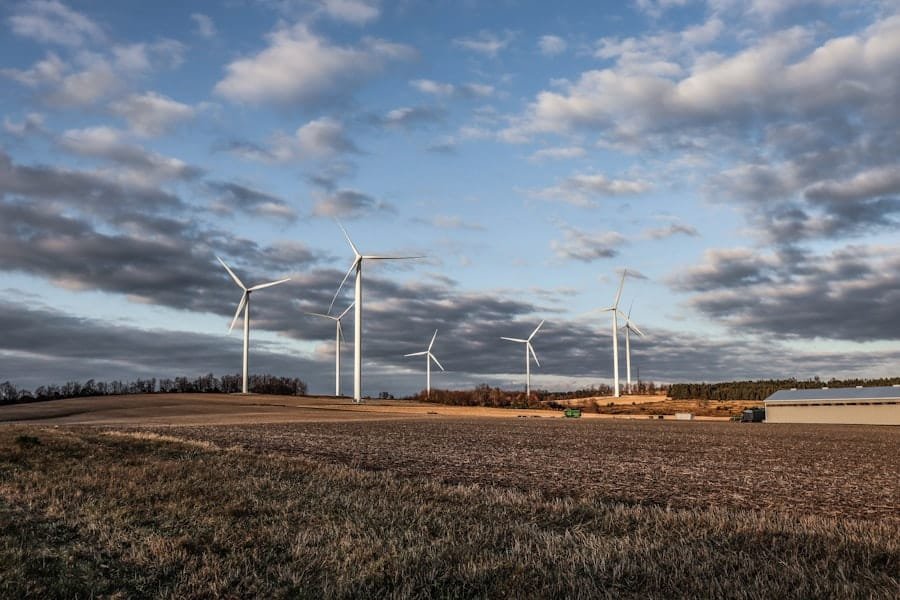Renewable energy is derived from naturally replenishing sources such as sunlight, wind, rain, tides, and geothermal heat. This form of energy is considered sustainable due to its inexhaustible nature and minimal environmental impact. Sustainable development aims to meet present needs without compromising future generations’ ability to meet their own needs.
The integration of renewable energy into sustainable development is essential for addressing climate change, environmental degradation, and energy security challenges. As global concerns about climate change and resource depletion grow, the significance of renewable energy in promoting sustainable development becomes increasingly apparent. Renewable energy plays a crucial role in reducing greenhouse gas emissions and mitigating climate change.
Unlike traditional fossil fuels, renewable energy technologies produce minimal to no carbon emissions when harnessing energy from natural sources like sunlight and wind. This not only helps combat global warming but also reduces air pollution and associated health risks. Furthermore, renewable energy promotes environmental sustainability by minimizing the extraction and consumption of finite resources, thereby preserving ecosystems and biodiversity.
The integration of renewable energy into sustainable development is vital for achieving a more balanced and harmonious relationship between human activities and the natural environment.
Key Takeaways
- Renewable energy is crucial for sustainable development as it reduces reliance on fossil fuels and mitigates climate change.
- Environmental benefits of renewable energy include reduced air and water pollution, conservation of natural resources, and protection of ecosystems.
- The economic impact of renewable energy on sustainable development includes job creation, cost savings, and economic growth in the renewable energy sector.
- Social benefits of renewable energy include improved public health, energy access for remote communities, and empowerment of local communities through energy independence.
- Renewable energy plays a key role in energy security by diversifying energy sources, reducing dependence on imports, and enhancing resilience to supply disruptions.
The Environmental Benefits of Renewable Energy
Reducing Greenhouse Gas Emissions and Combating Climate Change
One of the most significant advantages of renewable energy is its ability to reduce greenhouse gas emissions and combat climate change. Unlike fossil fuels, which release large amounts of carbon dioxide and other pollutants when burned, renewable energy sources such as solar and wind power produce minimal to no emissions during electricity generation.
Improving Air Quality and Public Health
This not only helps to mitigate the impacts of global warming but also improves air quality and reduces the prevalence of respiratory diseases and other health issues associated with air pollution.
Promoting Environmental Conservation and Ecological Balance
Furthermore, renewable energy technologies have a lower environmental impact compared to conventional energy sources. For example, hydropower plants have a relatively small footprint and do not produce air pollution, making them a cleaner alternative to coal-fired power plants. Similarly, solar panels and wind turbines can be installed on existing infrastructure or in remote areas without causing significant disruption to ecosystems. By harnessing the power of natural resources in a sustainable manner, renewable energy contributes to the preservation of biodiversity and ecosystems, thereby promoting environmental conservation and ecological balance.
The Economic Impact of Renewable Energy on Sustainable Development

The economic impact of renewable energy on sustainable development is multifaceted and extends beyond the energy sector. One of the most significant benefits is the creation of jobs and economic growth. The renewable energy industry has experienced rapid expansion in recent years, leading to the creation of numerous job opportunities in manufacturing, installation, maintenance, and research and development.
This not only stimulates local economies but also provides employment opportunities for a diverse range of skill sets, from engineers and technicians to construction workers and project managers. Moreover, the transition to renewable energy can reduce energy costs for consumers and businesses. As technology advances and economies of scale are realized, the cost of renewable energy generation continues to decline, making it increasingly competitive with traditional fossil fuels.
This not only reduces the financial burden on households and businesses but also enhances energy security by diversifying the energy mix and reducing reliance on imported fuels. Additionally, investments in renewable energy infrastructure contribute to long-term economic stability by reducing the volatility of energy prices and promoting energy independence.
The Social Benefits of Renewable Energy
Renewable energy offers numerous social benefits that contribute to improved quality of life and well-being for communities around the world. One of the most significant advantages is improved public health. By reducing air pollution and greenhouse gas emissions, renewable energy helps to mitigate the impacts of climate change and reduce the prevalence of respiratory diseases, cardiovascular conditions, and other health issues associated with poor air quality.
This not only lowers healthcare costs but also enhances overall public health and well-being. Furthermore, renewable energy projects can empower local communities by providing access to clean and affordable electricity. In many developing regions, off-grid renewable energy solutions such as solar home systems and mini-grids are enabling access to modern energy services for households, schools, healthcare facilities, and businesses that were previously underserved or unserved by traditional grid infrastructure.
This not only improves living standards but also fosters economic development by enabling productive activities such as small-scale agriculture, entrepreneurship, and education.
The Role of Renewable Energy in Energy Security
Renewable energy plays a crucial role in enhancing energy security by diversifying the energy mix and reducing dependence on imported fuels. Unlike fossil fuels, which are often subject to price volatility and geopolitical tensions, renewable energy sources such as sunlight, wind, and water are abundant and locally available in many regions. This reduces the vulnerability of energy systems to supply disruptions and price fluctuations, thereby promoting stability and resilience in the face of external shocks.
Moreover, renewable energy technologies offer decentralized and distributed solutions that can improve energy access and reliability for remote or underserved communities. Off-grid renewable energy systems such as solar panels and small-scale wind turbines provide a reliable source of electricity for households, schools, healthcare facilities, and businesses in areas where grid infrastructure is absent or unreliable. This not only enhances energy security but also fosters economic development and social empowerment by enabling access to modern energy services.
Challenges and Barriers to the Adoption of Renewable Energy

Despite its numerous benefits, the adoption of renewable energy faces several challenges and barriers that hinder its widespread deployment. One of the most significant obstacles is the intermittency and variability of certain renewable energy sources such as solar and wind power. Unlike conventional fossil fuel power plants, which can operate continuously regardless of weather conditions, solar panels and wind turbines are dependent on sunlight and wind speed for electricity generation.
This variability can pose challenges for grid integration and system stability, requiring innovative solutions such as energy storage, demand response, and smart grid technologies. Additionally, the upfront costs of renewable energy technologies can be a barrier to adoption for many consumers and businesses. While the long-term operational costs of renewable energy are often lower than those of fossil fuels, the initial investment required for equipment purchase and installation can be prohibitive for some stakeholders.
Access to financing mechanisms such as grants, subsidies, tax incentives, and low-interest loans can help to overcome this barrier and promote greater uptake of renewable energy solutions.
The Future of Renewable Energy in Promoting Sustainable Development
In conclusion, renewable energy plays a pivotal role in promoting sustainable development by offering environmental, economic, social, and security benefits. As the world continues to confront the challenges of climate change, environmental degradation, and energy insecurity, the integration of renewable energy into sustainable development is essential for achieving a more balanced and harmonious relationship between human activities and the natural environment. Despite facing challenges such as intermittency and upfront costs, renewable energy technologies continue to advance rapidly, becoming increasingly competitive with traditional fossil fuels while offering numerous opportunities for job creation, economic growth, public health improvement, and community empowerment.
The future of renewable energy in promoting sustainable development hinges on continued innovation, investment, policy support, and public awareness. By harnessing the power of natural resources in a sustainable manner, renewable energy has the potential to transform global energy systems, reduce greenhouse gas emissions, improve air quality, enhance public health, create employment opportunities, lower energy costs, foster economic development, empower communities, enhance energy security, and promote environmental conservation. As governments, businesses, communities, and individuals work together to overcome barriers and embrace the transition to renewable energy, a more sustainable future becomes increasingly achievable for current and future generations alike.
If you’re interested in learning more about the economic impact of renewable energy, check out this article on The Econosphere. The article discusses how the transition to renewable energy sources can promote sustainable development and create new economic opportunities. It provides valuable insights into the role of renewable energy in shaping the future of our economy and environment. For more information, you can also reach out to the team at The Econosphere or review their terms of service here.
FAQs
What is renewable energy?
Renewable energy is energy that is collected from renewable resources, which are naturally replenished on a human timescale, such as sunlight, wind, rain, tides, waves, and geothermal heat.
How does renewable energy promote sustainable development?
Renewable energy promotes sustainable development by reducing greenhouse gas emissions, decreasing air and water pollution, conserving natural resources, and creating economic opportunities in the form of new jobs and industries.
What are the environmental benefits of renewable energy?
Renewable energy sources produce little to no greenhouse gas emissions, reducing the impact of climate change. They also have lower environmental impact in terms of air and water pollution compared to traditional energy sources.
What are the economic benefits of renewable energy?
Renewable energy creates jobs in manufacturing, installation, and maintenance of renewable energy systems. It also reduces reliance on imported fuels, which can stabilize energy prices and improve energy security.
What are some examples of renewable energy sources?
Examples of renewable energy sources include solar power, wind power, hydroelectric power, biomass, and geothermal energy.
How can renewable energy be integrated into sustainable development goals?
Renewable energy can contribute to sustainable development goals by providing access to clean and affordable energy, promoting economic growth, and addressing climate change and environmental concerns.








